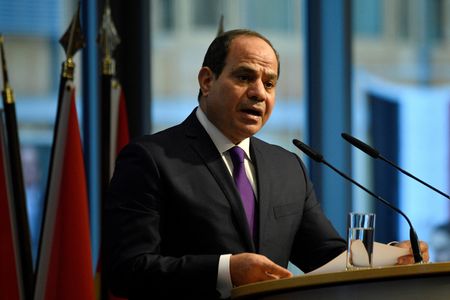By Stephanie Kelly
NEW YORK (Reuters) -Oil prices edged lower on Tuesday after U.S. President Donald Trump’s 50-day deadline for Russia to end the Ukraine war and avoid sanctions eased concerns about any immediate supply disruption.
Brent crude futures were down 15 cents at $69.06 a barrel by 10:54 a.m.. U.S. West Texas Intermediate crude futures were down 30 cents at $66.68.
“The focus has been on Donald Trump. There was some fear he might target Russia with sanctions immediately and now he has given another 50 days,” said UBS commodities analyst Giovanni Staunovo. “Those fears about an imminent additional tightness in the market have dissipated. That’s the main story.”
Oil prices had climbed on the potential sanctions but later gave up gains as the 50-day deadline raised hopes that sanctions could be avoided.
In the event the proposed sanctions are implemented, “it would drastically change the outlook for the oil market,” analysts at ING said in a note on Tuesday.
“China, India and Turkey are the largest buyers of Russian crude oil. They would need to weigh the benefits of buying discounted Russian crude oil against the cost of their exports to the U.S.,” the ING note said.
Trump announced new weapons for Ukraine on Monday and had said on Saturday that he would impose a 30% tariff on most imports from the European Union and Mexico from August 1, adding to similar warnings for other countries.
Tariffs raise the risk of slower economic growth, which could reduce global fuel demand and drag oil prices lower.
China’s economy slowed in the second quarter, data showed on Tuesday, with markets bracing for a weaker second half as exports lose momentum, prices continue to fall and consumer confidence remains low.
Tony Sycamore, an analyst at IG, said economic growth in China came in above consensus, largely because of strong fiscal support and the front-loading of production and exports to beat U.S. tariffs.
“The Chinese economic data was supportive overnight,” said Phil Flynn, senior analyst with Price Futures Group.
Elsewhere, oil demand is set to remain “very strong” through the third quarter, keeping the market balanced in the near term, the Organization of the Petroleum Exporting Countries’ secretary general said, according to a Russian media report.
(Reporting by Stephanie Kelly in New York; Additional reporting by Anna Hirtenstein in London, Anjana Anil in Bengaluru and Sudarshan Varadhan in SingaporeEditing by Louise Heavens, Sharon Singleton, David Goodman and Barbara Lewis)









